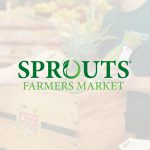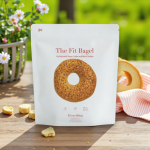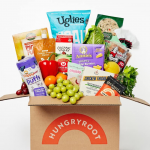GoodSam Launches Mission-Focused Chocolate Brand
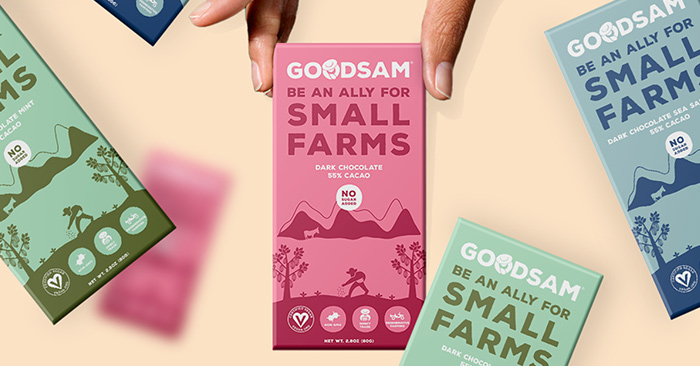
For chocolate maker GoodSam Foods, the latest brand to emerge from incubator and accelerator BeyondBrands, the goal is simple: make products that are “good for you, good for farmers and good for the planet.” Led by BeyondBrands chief strategy officer and Nibmor co-founder Heather K. Terry, the company recently launched with a goal of using chocolate as a springboard for developing into a sugar-free snack platform focused on transparency and sustainability.
The brand, which produces chocolate bars, chocolate coated nuts and chocolate chips, has a dual mission of helping both farmers and the planet.
The idea behind GoodSam dates back to 2018, when entrepreneur Sam Stroot approached BeyondBrands after struggling to launch a dried fruit company. Stroot had formed supply chain connections in Colombia — the second most biodiverse country in the world — with the goal to utilize the country’s rich agricultural heritage as the basis for a food brand.
BeyondBrands founder Eric Schnell, however, recommended Stroot instead consider Colombia’s cocoa. Terry, who had previously co-founded, run and eventually sold organic chocolate brand Nibmor, proved to be a perfect fit for the venture, and came on board as GoodSam’s co-founder and CEO as well as chief strategy officer for BeyondBrands.
Unlike some other mission-focused chocolate brands, GoodSam has a direct trade program that allows it to form close relationships with farmers and support their use of regenerative and sustaining farming practices. The brand pays higher premiums for labor than other trade programs, with 1% of top-line sales also going to community improvement.
The first product offering from GoodSam, which launched in November, was created in partnership with Thrive Market. The online retailer’s chief merchandising officer Jeremiah McElwee joined Terry and Stroot in Colombia last year, and challenged the duo to also make its products sugar free. After an “intense” eight month R&D process, the company found success with allulose as a sweetener.
GoodSam’s chocolate bar line launched exclusively with Thrive Market in November in three varieties: Dark Chocolate, Dark Chocolate & Sea Salt Nibs and Dark Chocolate & Mint. The brand aims to keep its products simple and classic, rather than leaning into the functional chocolate trend. Despite ever-shifting preferences and shopping habits, consumers also “just want chocolate to be chocolate and they want it to taste good,” Terry said.
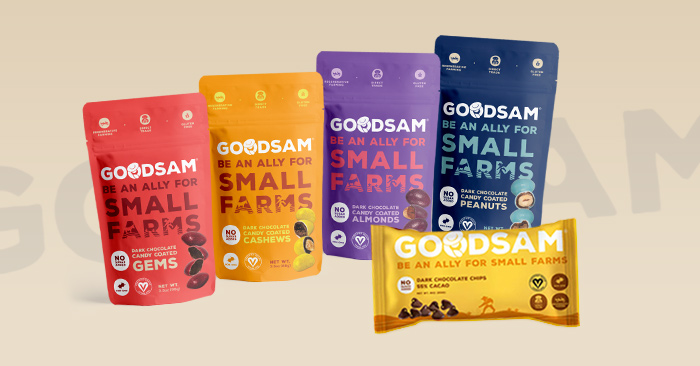
After expanding into the baking aisle with the launch of dark chocolate baking chips earlier this month, the brand will also roll out its keto-friendly sugar-free dark chocolate candy coated line, which includes cashews, almonds, peanuts and M&M-like gems. Terry and Stroot “hope to hang our hat on” the new line, as GoodSam establishes itself as a snack brand.
For the near future GoodSam is focused on the direct-to-consumer channel, Terry said, launching soon its own ecommerce store and on Amazon. Shipping chocolate products during the hot summer months can require extra effort, but Terry believes launching a new brand into brick and mortar retailers is “really rolling the dice” on a brand’s finances.
“I’ve seen it over and over again, overeager brands, young brands, young founders, the retailer comes and it seems really sexy and cool,” she said. “Then you’ve watched them almost go bust within a year because the financial obligation to wholesale retail is big. So until GoodSam is posting the numbers and really has the brand awareness out there, we’re gonna hold on retail.”
In terms of GoodSam’s company structure, Schnell serves as chairman of the board, while BeyondBrands’ chief investment officer David Tsiang is also the brand’s financial director. The rest of the GoodSam team is spread across Colombia, Kenya, Canada and the U.S.
With a focus on partnering with farms that practice regenerative and sustainable farming methods, the brand is also working on macadamia nut products sourced from Kenya, and will launch a single origin coffee in the spring. While the concept of sustainability may be “hip and trendy” in the industry, Terry said she advises brands to avoid “greenwashing” and do the work to be authentic and transparent about their sourcing practices.
“I encourage anybody who’s able and willing to get out there and see what’s really happening in their supply chain to do it,” Terry said. “It’s really important to the future of the world when we talk about sustainability, traceability and regenerative agriculture, and I want as many people participating in those things at the table as we can get in the industry.”

